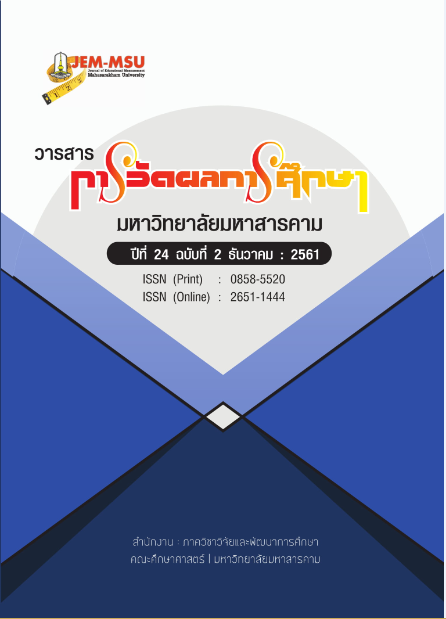The Learning Experience Development Based on Psyco-Intellectual Model to Enhance Values in Early Childhood Children
Main Article Content
Abstract
The purposes of this study were 1) to study the need to promote desired values in early childhood children of Ban Panusdongsawang Child Development Center, 2) to develop learning experience organizing based on Psycho–Intellectual Model promoting the values of early childhood children as needed, 3) to find the efficiency of the learning experience model based on the Psycho–Intellectual Model promoting the values of early childhood children and assess it against the 80/80 efficiency criteria, and 4) to study the effectiveness index of organizing learning experiences based on the concept of Psycho–Intellectual Model promoting the values of early childhood children. The sample in this study comprised the administrator, teachers, educational personnel, the members of the child development center committee and parents of the children at Ban Panusdongsawang Child Development Center, under the Chanuwan Sub-district Administrative Organization, Phanomprai District, Roi Et Province, and the preschool children aged 3 to 4 who were learning in Kindergarten 2 in the second semester of the academic year 2015, under the Chanuwan Sub-district Administrative Organization, Phanomprai District, Roi Et Province, obtained through the purposive sampling technique. The tools used in the research were 1) a need questionnaire to promote the values of early childhood children, 2) the plans of organizing learning experiences based on the concept of mental intelligence, and 3) a test on values. Data were analyzed by using percentage, the mean and standard deviation.
The findings of the study were as follow:
1. Regarding the results of the study on the need to promote desired values in early childhood children of Ban Panusdongsawang Child Development Center, it was found that the majority of the respondents wanted the values of the early childhood children, on the aspect of yearning to know, disciplines and being economical, be promoted. The need was rated at a highest level.
2. The development of organizing learning experiences based on the concept of the Psycho–Intellectual Model to promote the values of early childhood children, had 3 steps. Step 1: introduction to the lesson; step 2: organizing learning activities which comprised 5 learning activities: 1) the learner’s hands-on activity and thinking (A), 2) the learner expresses herself through the hands-on activity (B), 3) the learner learns cooperatively (C), 4) the Learner learns by discovery (D), 5) the learner is advanced in learning (P), step 3: making the conclusion.
3. The efficiency of organizing learning experiences based on mental intelligence to promote the values of early childhood children was 89.33/82.33.
4. The effectiveness index of organizing learning experiences based on mental intelligence to promote the values of early childhood children was 0.7414. This indicates that the early childhood children had a 74-percent progress after learning.
Article Details
The content and information contained in the published article in the Journal of Educational Measurement Mahasarakham University represent the opinions and responsibilities of the authors directly. The editorial board of the journal is not necessarily in agreement with or responsible for any of the content.
The articles, data, content, images, etc. that have been published in the Journal of Educational Measurement Mahasarakham University are copyrighted by the journal. If any individual or organization wishes to reproduce or perform any actions involving the entirety or any part of the content, they must obtain written permission from the Journal of Educational Measurement Mahasarakham University.
References
ณรงค์ เส็งประชา. (2551). พื้นฐานวัฒนธรรมไทย. กรุงเทพฯ : โอเดียนสโตร์.
บงกช ทองเอี่ยม. (2551). ผลการจัดกิจกรรมการเรียนรู้แบบจิตปัญญาที่มีต่อความคิดสร้างสรรค์ของเด็กปฐมวัย.วิทยานิพนธ์การศึกษามหาบัณฑิต กรุงเทพฯ:มหาวิทยาลัยศรีนครินทรวิโรฒ.
บุหงา ศรีเดช. (2552). ทักษะทางภาษาของเด็กปฐมวัยที่ได้รับการจัดกิจกรรมการเรียนรู้แบบจิตปัญญา.วิทยานิพนธ์ครุศาสตรมหาบัณฑิต กรุงเทพ: มหาวิทยาลัยราชภัฏสวนสุนันทา.
รานี ศิลปะชัย. (2547). คู่มือประกอบการสอนวิชาชีวิตและวัฒนธรรมไทย. ระยอง : วิทยาลัยเทคนิคระยอง.
สถาบันบัณฑิตบริหารธุรกิจศศินทร์แห่งจุฬาลงกรณ์มหาวิทยาลัย. (2553). โครงการศึกษาวิจัยพลวัตรการเปลี่ยนแปลงทางวัฒนธรรมของโลกที่มีผลกระทบต่อวัฒนธรรมสังคมไทย.
กรุงเทพฯ : สำนักงาน คณะกรรมการเศรษฐกิจและสังคมแห่งชาติ.
สุธาทิพย์ วิเชียรวัฒนชัย. (2554). การศึกษาความต้องการของผู้ปกครองเกี่ยวกับพฤติกรรมที่ควรปลูกฝังและพฤติกรรมที่ปรากฏด้านคุณธรรมของเด็กปฐมวัย. วิทยานิพนธ์การศึกษามหาบัณฑิต
กรุงเทพฯ : มหาวิทยาลัยศรีนครินทรวิโรฒ.
สังเวียน พึ่งแสง. (2552). ผลของการจัดกิจกรรมการเรียนรู้แบบจิตปัญญาที่มีต่อพัฒนาการทางสังคมของเด็กปฐมวัย. วิทยานิพนธ์การศึกษามหาบัณฑิต กรุงเทพฯ : มหาวิทยาลัยศรีนครินทรวิโรฒ.
สำนักงานคณะกรรมการวัฒนธรรมแห่งชาติ. (2553). วิทยากรกับการปลูกฝังและเสริมสร้างค่านิยม. พิมพ์ครั้งที่ 2.
เสาวภา ไพทยวัฒน์. (2538). พื้นฐานวัฒนธรรมไทย : แนวทางอนุรักษ์และการพัฒนา. ภาคพัฒนาตำราและเอกสารวิชาการ หน่วยศึกษานิเทศก์ สำนักงานสภาสถาบันราชภัฏ.
หทัยรัตน์ ทรวดทรง. (2550). การศึกษาความสามารถทางพหุปัญญาของเด็กปฐมวัยที่ได้รับการจัดกิจกรรมการสอนแบบจิตปัญญา. วิทยานิพนธ์การศึกษามหาบัณฑิต กรุงเทพฯ : มหาวิทยาลัยศรีนครินทรวิโรฒ.


